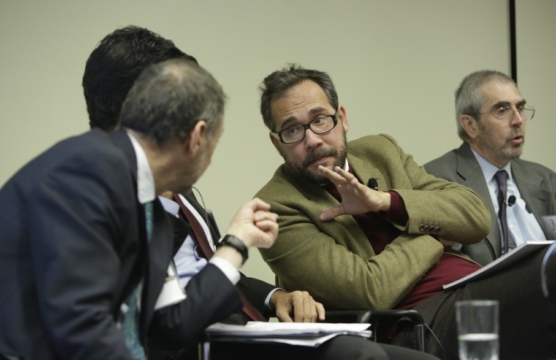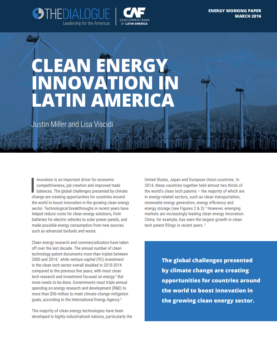
Latin America’s Productivity Challenge
There is a gap between the skills that the Latin American workforce offers and the skills that companies in the region demand.
This post is also available in: Español
On August 31st, the Education Program at the Inter-American Dialogue presented its new report authored by Sarah Stanton and published with the support of Pearson. This latest publication is the third in a series focused on English language learning in Latin America. The virtual event also included a panel of experts in the areas of English language acquisition, technical and professional education, and labor market demands.
The panel included Rosa María Cely Herrera, national director of the English and Bilingualism Program at Compensar University Foundation; Marisol Rojas Salas, head of the Language for Work Program at the National Technical University of Costa Rica; and Joseph Fidanque III, director of Iterum BPO Services. During his welcoming remarks, Sebastián Rodríguez, vicepresident of Sales Operations at Pearson Latin America, said that the ability to speak a second language is one of the most significant demands in the labor market worldwide. Ariel Fiszbein, director of the Inter-American Dialogue Education Program, then introduced Sarah Stanton to present the main findings of the report.
The report examines English language instruction in technical and professional education in six Latin American countries: Chile, Colombia, Costa Rica, Ecuador, Peru, and Uruguay. The research process included a review of the legal and regulatory frameworks for teaching English in technical training programs, as well as the extent to which English language instruction focuses on technical English (or English for specific purposes) versus a more generalized language preparation. The report also looks at the gaps between the language skills that students acquire in their technical and professional education, and the demand for English in the labor market, with a specific focus on the tourism and hospitality industry given its important role in the economic development of Latin America, as well as the high demand for English within the sector.
The report is organized into sections focusing on English language learning policies in technical and professional education, English for employment, and how to respond to the labor market demands. One of the main findings is that, despite progress, the implementation of English instruction for specific purposes remains an unaddressed challenge in many countries, since most curricula are focused only on general English instruction. This issue is further complicated by the fact that many English instructors lack specialized training to teach technical English, in large part because such training does not exist as part of the standard teacher education programs. Finally, the report presents the following key recommendations:
After Stanton’s presentation, Fiszbein invited the panelists to reflect on the topic and encouraged them to speak from their particular perspectives to share their experiences across different countries and sectors.
One of the most important subjects discussed was the relationship between academia and the business sector. For example, in the case of Compensar University Foundation, Cely mentioned that her university has the university-enterprise seal, giving them an advantage when lobbying for public policy and when working towards new curricula. This characteristic allows them to close the gap between what employers demand in terms of English skills and what universities and colleges offer.
Another tool for bridging these gaps in Colombia is SENA’s inter-sectoral roundtables, collaborative spaces where private industry, public sector experts, and academia can convene to agree on how to develop human capital and generate proposals and guidelines for transferable knowledge competencies in professional training. In Colombia’s case, there are numerous inter-sectoral roundtables, organized by region, and varying in number and focal area depending on the needs of each region. Their purpose is to close the gap between universities, training centers, and the labor market.
From the private sector, Fidanque III indicated that, based upon his experience as a service provider, this sector is much more willing to collaborate in building human capital, as they find that it is difficult in most cases to identify strong job candidates with a mastery of English at the required level. For example, Fidanque III sees a major challenge in the fact that there are no clear objectives and the current approach emphasizes quantity over quality.
In addition, both Rojas and Fidanque III emphasized that it is vital that students develop these skills through their inclusion in official curricula, thus allowing the workforce to obtain the English level required for professional success and, with it, greater opportunities for social mobility. Fidanque III also mentioned that a possible explanation for the difference between the level of English mastery and the technical and academic degrees presented by the report could be due to the self-taught nature of technical education.
In response to a question from the audience about how to close the previously discussed gaps, Stanton emphasized that there are many innovative practices in English instruction in Latin America and that the coordination of national language policy is of the utmost importance. From her perspective, there is a greater urgency for developing conversational (rather than technical) English due to the labor market demands in the region.
Finally, Fiszbein stressed that improving English instruction in basic education, professional training, and university education is an important challenge for Latin America to overcome. In order to achieve this goal, multi-sectoral collaboration is critical in order to articulate public policies that consider both the public and private sectors’ needs to generate greater opportunities in the long-term for those who make up the workforce.
There is a gap between the skills that the Latin American workforce offers and the skills that companies in the region demand.
In the wake of the COP21 global climate talks, governments must shift attention to how they will actually follow through on the commitments made in Paris. One concept is central to achieving that goal – innovation.
Online competency-based education (OCBE) has emerged as a viable option to help reduce the skills gap in the Americas
 Main photo: Javier Trueba / Unsplash / CCO
Main photo: Javier Trueba / Unsplash / CCO
 Video
Video
